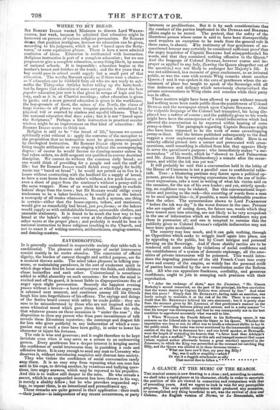WHERE TO BUY BREAD.
SIR ROBERT INGLIS wanted Ministers to disown Lord %URN- currE, last week, because he admitted that education might be bestowed on persons of various religious persuasions. Sir ROBERT deems that position irreligious, because no education can be given, according to his judgment, which is not "based upon the Scrip- tures," or some equivalent phrase. There is here a most admired confusion of ideas. Education is confounded with instruction. Religious instruction is part of a complete education ; but no one proposes to give a complete education, or any thing like it, by means of national schools. It is impossible : education begins at the mother's breast and finishes at the tomb ; and the few years that a boy could pass in school could supply but a small part of that education. The worthy Baronet speaks as if there were a choice— as if education can be withheld from all who are not ready to sub- scribe the Thirty-nine Articles before taking up the horn-book : but he forgets that education of some sort goes on. About the best popular education just now is that given in scraps of logic and his- tory, such as it is, at Chartist meetings ; other education is given in gaols ; and a more general education is given in the workhouse, the hop-grounds of Kent, the mines of the North, the slums of large towns—in all places were irregular passion is stimulated by physical toil or courted by aimless and squalid idleness. That is the national education that does exist ; but it is not "based upon the Scriptures." Perhaps a little instruction in practical secular -wisdom might be an improvement on that kind of education : Sir ROBERT INGLIS seems to think not.
Religion is said to be "the bread of life," because we cannot spiritually exist without it : apply the converse of the metaphor to the proposition that no instruction must be given unaccompanied by theological instruction. Sir ROBERT INGLIS objects to people being taught arithmetic or even singing without the accompanying dogma : of course he would license no dancing-master unless he had taken orders, no drill-sergeant not qualified to convey doctrinal discipline. We cannot do without the common daily bread; no one would think of providing for a people and omit the staff of life : but Sir ROBERT hulas would forbid every supply for bodily wants not "based on bread " ; he would not permit us to live in a house without contracting with the landlord for a supply of bread, to have a coat home from the tailor's without a few peck-loaves, or even a sheet of paper from the stationer's without a penny-roll in the same wrapper. None of us would be mad enough to exclude bakers' shops from the town ; but Sir ROBERT would oblige every tradesman to be a baker besides, or be would give to the bakers a monopoly of all trades whatsoever. In such a system, one thing is certain—either that the house-agents, tailors, and stationers, would give us remarkably bad bread, just pro forma; or the bakers would supply us with uninhabitable houses, uuwearable clothes, and unusable stationery. It is found to be much the best way to buy bread at the baker's only—not even at the chandler's shop—and other wares at the proper place ; and probably it would be best in national instruction to leave religious teaching to the Church, and not to exact it of writing-masters, arithmeticians, singing-masters, and dancing-masters.


























 Previous page
Previous page